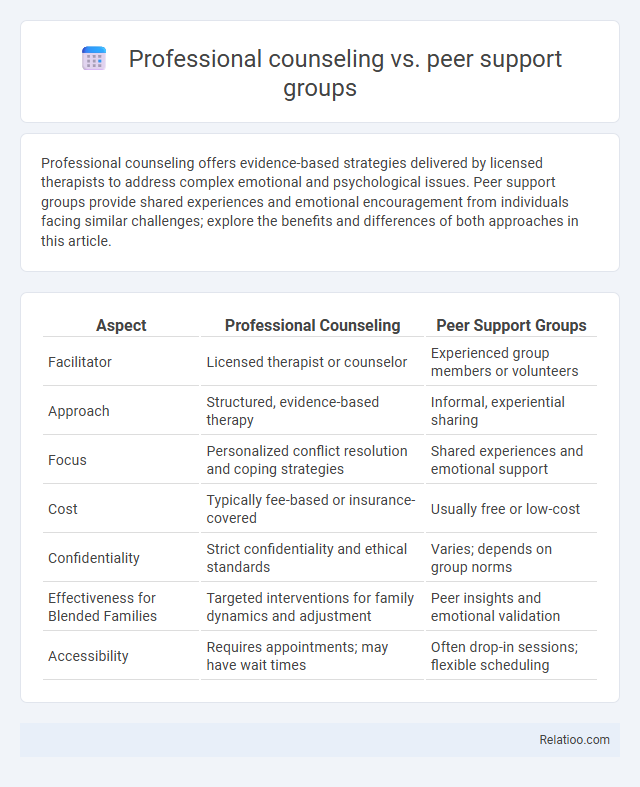Professional counseling offers evidence-based strategies delivered by licensed therapists to address complex emotional and psychological issues. Peer support groups provide shared experiences and emotional encouragement from individuals facing similar challenges; explore the benefits and differences of both approaches in this article.
Table of Comparison
| Aspect | Professional Counseling | Peer Support Groups |
|---|---|---|
| Facilitator | Licensed therapist or counselor | Experienced group members or volunteers |
| Approach | Structured, evidence-based therapy | Informal, experiential sharing |
| Focus | Personalized conflict resolution and coping strategies | Shared experiences and emotional support |
| Cost | Typically fee-based or insurance-covered | Usually free or low-cost |
| Confidentiality | Strict confidentiality and ethical standards | Varies; depends on group norms |
| Effectiveness for Blended Families | Targeted interventions for family dynamics and adjustment | Peer insights and emotional validation |
| Accessibility | Requires appointments; may have wait times | Often drop-in sessions; flexible scheduling |
Understanding Professional Counseling
Professional counseling provides you with evidence-based therapeutic techniques delivered by licensed mental health experts, ensuring personalized and confidential care. Unlike peer support groups, which offer shared experiences and emotional solidarity, professional counseling targets specific psychological issues with tailored interventions. A strong support network complements counseling but lacks the clinical expertise that guides you through structured treatment plans to promote mental wellness.
Defining Peer Support Groups
Peer support groups are organized gatherings where individuals with shared experiences provide emotional and practical support to each other, often led by peers rather than professionals. Unlike professional counseling, which involves trained therapists offering structured intervention, peer support groups emphasize mutual understanding and shared coping strategies. Your participation in these groups fosters connection and empowerment within a community facing similar challenges, complementing the broader support network of family, friends, and professionals.
Key Differences Between Counseling and Peer Support
Professional counseling involves licensed therapists who provide evidence-based interventions tailored to your mental health needs, while peer support groups rely on shared experiences and mutual encouragement without formal clinical guidance. Counseling offers structured treatment plans and confidentiality under legal standards, whereas peer support emphasizes community connection and emotional understanding in a less formal setting. Support networks combine elements of both, but the key difference lies in the counselor's expertise and accountability versus the peer group's experiential empathy.
Benefits of Professional Counseling
Professional counseling offers evidence-based strategies and personalized treatment plans tailored to individual mental health needs, enhancing emotional resilience and coping skills. Licensed therapists provide confidentiality and a safe environment for exploring complex psychological issues, leading to measurable improvements in mental well-being. Unlike peer support groups or informal networks, professional counseling integrates clinical expertise and therapeutic interventions that can address deeper mental health disorders effectively.
Advantages of Peer Support Groups
Peer support groups offer unique advantages by fostering a sense of community and shared understanding among members facing similar challenges, which professional counseling may not provide. These groups promote empowerment, mutual encouragement, and practical advice based on lived experiences, enhancing emotional resilience. The accessibility and cost-effectiveness of peer support groups make them a valuable complement to traditional mental health services.
When to Choose Professional Counseling
Professional counseling is ideal for individuals facing severe mental health issues, trauma, or complex emotional challenges requiring expert intervention. When symptoms interfere significantly with daily functioning or when personalized therapeutic techniques and diagnostic assessments are necessary, professional counselors provide evidence-based treatment plans. Unlike peer support groups or informal support networks, counseling ensures confidentiality and trained guidance tailored to individual psychological needs.
When Peer Support Groups Are Most Effective
Peer support groups are most effective when individuals seek shared experiences and mutual understanding, offering emotional relief through collective empathy that complements, but does not replace, professional counseling. Professional counseling provides structured guidance and evidence-based interventions led by licensed therapists, ideal for addressing complex mental health issues and personalized treatment plans. Your support network, including family and friends, offers ongoing practical assistance and social connection essential for long-term recovery and resilience.
Confidentiality and Privacy Considerations
Professional counseling ensures confidentiality through legally binding ethical standards and privacy laws like HIPAA, safeguarding sensitive information with strict protocols. Peer support groups may offer a safe space but lack formal confidentiality agreements, potentially exposing personal disclosures to other members without legal protection. Support networks, often informal, rarely guarantee privacy, increasing risks of information sharing beyond intended circles, making discretion essential.
Cost and Accessibility Comparison
Professional counseling often involves higher costs, including session fees and insurance considerations, which may limit accessibility for some individuals. Peer support groups generally provide free or low-cost services, making them more accessible but sometimes offering less individualized expertise. Support networks, such as family or community groups, are typically accessible at no financial cost but may lack professional guidance and confidentiality.
Combining Counseling and Peer Support for Better Outcomes
Combining professional counseling with peer support groups enhances your mental health journey by offering expert guidance alongside shared experiences that foster empathy and practical advice. Professional counselors utilize evidence-based techniques to address individual challenges, while peer support groups provide emotional validation and a sense of community that promotes accountability and ongoing motivation. Integrating these approaches creates a comprehensive support network, increasing the likelihood of sustained recovery and improved overall well-being.

Infographic: Professional counseling vs Peer support groups
 relatioo.com
relatioo.com